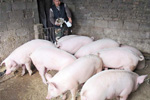Rural-urban shifts put China on development alert
Updated: 2012-01-31 13:29
(Xinhua)
|
|||||||||||
Regarding this phenomenon as "not coincidental," Wu Yingxi, an official with the Commerce Bureau of Shandong province, another heavily populated province in eastern China, sees even harder times ahead for these traditional engines of the Chinese economy.
Citing a survey the bureau completed that targeted rural migrant workers born in the 1990s, Wu said rising labor costs were inadequate remedies for helping China's labor-intensive manufacturers hold their position.
"The new generation of rural migrant workers would rather live a hard life in cities than stay at home comfortably. But they would also rather earn less in the service industry than work overtime for higher pay in factories," Wu said.
To attract industrial workers, Wu said manufacturing companies must change the piecework payment structure, provide employees innovation-oriented training to improve corporate productivity, seize time to move up in the value-added chain and have migrant workers benefit more from corporate profits.
"The government, on the other hand, should invest heavily in education to improve the quality of the population and coordinate the development of metropolises and small cities," said Zheng Zizhen, formerly of the Guangdong Academy of Social Sciences.
Urban social management
No cities can absorb newcomers without limits. A city the size of Guangzhou faces an enormous challenge in minding the gap between local residents and incoming rural migrants.
"The transformation from an agricultural society to an industrialized one will weaken the bonds of clans, kinship or acquaintances that remain prevalent in rural China. When rural migrants move to cities, they are basically thrown into a society of strangers. A city's friendliness and openness to outsiders is therefore crucial to maintaining social stability and harmony," Zheng said.
Although he has lived here for over two decades, Zhang Xiyang, originally from Sichuan, complained that his children don't have access to cheaper, but better public education options that local children can enjoy. His greatest hope for the Year of the Dragon is that he will acquire an urban household registration in Guangzhou.
Hu Xiaoyan, the first migrant worker representative to attend the National People's Congress, or China's top legislature, said a majority of migrant workers still feel they can not enjoy equal treatment in cities, especially in terms of medical and education services.
Blueprint for rural areas
Dang Guoying, a rural development researcher with the Chinese Academy of Social Sciences, warned of a labor force drain in rural areas. "When people swarm into cities, questions on rural governance and the future of agriculture also surface."
"Statistically, we can say China has crossed the threshold of an urbanized society. But agriculture and farmers remain the bedrock of the world's most populous country," said Zheng Zizhen.
In a signed article titled "China's Agriculture and the Development Road of Rural Areas" that appeared in the Qiushi Journal under the Central Committee of the Communist Party of China on January 16, Premier Wen Jiabao said that the modernization of agriculture should never be ignored during the process of industrialization and urbanization.
Related Stories
Rural-urban learning exchange 2010-07-30 07:47
Rural-urban healthcare gap to be stitched up 2010-12-09 08:00
Rural-urban healthcare gap to be stitched up 2010-12-09 08:25
Rural-urban learning exchange 2010-07-30 15:35
- China to overhaul food standards
- Seven detained over S China river pollution
- Young migrant workers hope to settle in cities
- Shaolin told to clean up its image
- Zhejiang moving to ease financial pressures for firms
- China eyes overseas metal bases
- Beijing Telecom may launch CDMA iPhone 4S
- Policies chill property sales








